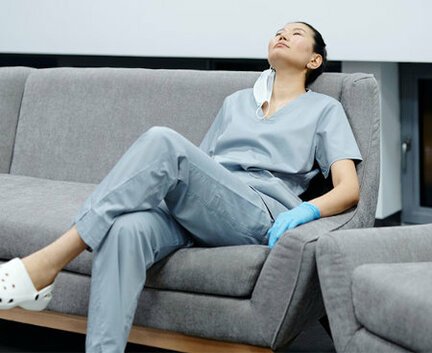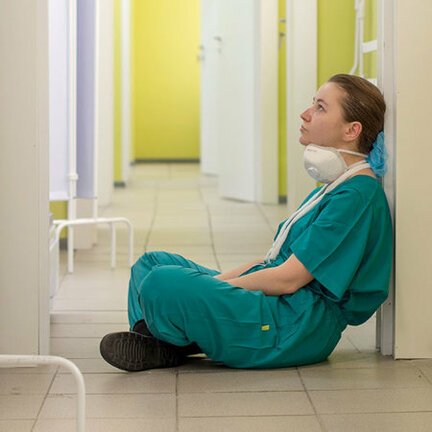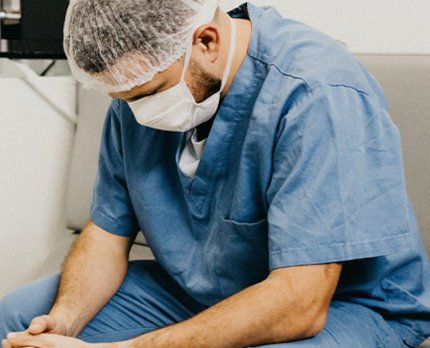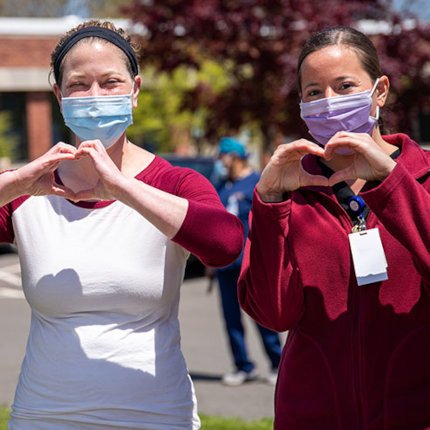Information for Nurses With Sleeping Troubles and PTSD Due to COVID-19

Effects of the Staffing Shortage

Not only is there now a shortage of nurses, but there is also a shortage of patient beds. Health Affairs says that “about 15 percent of hospital-employed RNs, or nearly 290,000 nurses, work in critical care units … Doubling the number of ICU beds [to accommodate the number of patients needing care for COVID-19] would outstrip the RN workforce trained in intensive care.” To assist new patients entering the hospital, nurses trained in intensive care are being asked to move from their designated floor to the intensive care unit (ICU), where they may care for patients afflicted with COVID-19. This situation then creates a shortage of nurses in units other than the ICU.
What complicates matters further is that many nurses do not choose to remain in the ICU due to the fear, stress, and anxiety that COVID-19 has caused. NBC News reports that nurses have left because “they were ill-equipped and unable to fight the disease” and “new CDC protocols have made them feel expendable and have not kept their safety in mind.” Thus, the nurses who have chosen to remain in the ICU despite the staffing shortage are experiencing higher workload volumes to make up for those who have left.
What’s more, according to Registered Nursing, “in any given state, 7-26% of coronavirus infections are healthcare workers.” Not only are nurses troubled by the environment around them, but some are also becoming afflicted with the disease despite numerous precautions. These harsh circumstances have led to a decline in overall well-being and an increase in nurse burnout.
Sleep Deprivation
Sleep deprivation is a common side effect of working within the ICU during the COVID-19 pandemic. In a 2020 study sampling 100 healthcare workers, 57 “manifested new onset or worsening of insomnia during the attention to COVID-19 patients.” The same study also questioned 70 workers who were not in healthcare for comparison; they had lower sleep deprivation reports than those currently in healthcare. The research suggests that the COVID-19 pandemic is undoubtedly having adverse sleep effects on nurses (and other healthcare professionals) who work 8-hour shifts.
However, some nurses choose to work 12-hour shifts over the course of three consecutive days. EHS Today notes that this trend began in the 1970s and 80s due to incentives, such as providing more time off work. While some nurses say that these shifts offer more benefits and provide opportunities to live a life outside of their occupation, studies show that the lack of sleep shared between these shifts harms performance. Coupled with the stress induced by COVID-19, nurses are experiencing more fatigue now than ever before. Working 12-hour shifts also puts nurses at higher risk of catching COVID-19 due to prolonged patient exposure and possible error caused by sleep deprivation.
The Atlanta Journal-Constitution argues that there are eight ways to combat sleep deprivation, such as:
- Sticking to structure
- Skipping naps
- Staying away from electronics close to bedtime
- Watching the bedroom temperature
- Exercising in the afternoon
- Cutting back on late shift caffeine
- Avoiding alcohol within three hours of bedtime
- Not weaponizing sleep
We at AcousticSheep provide numerous products that may assist in correcting sleep difficulties. Our SleepPhones® headphones offer a comfortable way to listen to music as you fall asleep.
Post-Traumatic Stress Disorder

Given the unpredictability that comes with the profession, healthcare workers may lose their patients. And, since the onset of the COVID-19 pandemic, visitor restrictions have been put in place to limit traffic and reduce the disease’s spread. These circumstances mean that nurses have had to become stand-ins for patients’ family members, but some patients have been fortunate enough to see their families at least electronically using a tablet.
However, this also means that patients have passed away without their loved ones by their side. In their place, nurses have offered their presence to provide comfort in a patient’s final moments. When personally asked about the patients who have passed away in her care, Nichole Glass, a frontline nurse at Saint Vincent Health Center, has said that these situations take an extreme emotional toll on a nurse’s well-being. Despite this toll, Ms. Glass has stated that she has been happy to offer such an immense amount of care and support during this difficult time.
PTSD must be identified by multiple criteria, such as:
- Exposure to trauma
- Experiencing flashbacks or nightmares
- Uncontrollable thoughts
- Emotional distress
- Avoiding thoughts, feelings, and objects associated with the traumatic event
- Self-isolation
- Difficulty sleeping
- Constant self-blame
- Irritability
- Constant negativity
- Memory loss associated with the traumatic event
It is best to avoid self-diagnosis. However, if you find yourself experiencing two or more of these symptoms for longer than a month, contact your healthcare provider or reach out to the National Center for PTSD.
Secondary Traumatic Stress
Another form of stress, known as Secondary Traumatic Stress (STS), has appeared in association with frontline nurses. As defined by the National Child Traumatic Stress Network (NCTSN), STS is the “emotional duress that results when an individual hears about the firsthand trauma experiences of another.” STS is similar to PTSD in that it deals with traumatic experiences; however, the individual is not exposed to the trauma firsthand. This condition is also referred to as “compassion fatigue” and can occur at any given time.
The Treatment and Services Adaptation Center says that the most common symptoms of STS are:
- Feelings of numbness, detachment, or hopelessness
- Low energy
- Self-destructive coping mechanisms
- Poor decision-making
- Poor performance
- Confusion
- Emotional unavailability
- Physical withdrawal
Support for Frontline Workers

